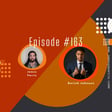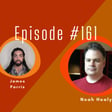
Jimbo Paris Show #71- Accelerate Your Career (Mark Herschberg)
“All of us can get better if we train and the same is true for charisma, as well as skills in my book like leadership, networking and negotiating.”
-Mark Herschberg
Welcome to The Jimbo Paris Show #71- Accelerate Your Career (Mark Herschberg)
Mark Herschberg is the author of “The Career Toolkit, Essential Skills for Success That No One Taught You”. From tracking criminals and terrorists on the dark web to creating marketplaces and new authentication systems, Mark has spent his career launching and developing new ventures at startups and Fortune 500s and in academia.
He helped to start the Undergraduate Practice Opportunities Program, dubbed MIT’s “career success accelerator,” where he teaches annually. At MIT, he received a B.S. in physics, a B.S. in electrical engineering & computer science, and a M.Eng. in electrical engineering & computer science, focusing on cryptography.
At Harvard Business School, Mark helped create a platform used to teach finance at prominent business schools. He also works with many non-profits, including Techie Youth and Plant A Million Corals.
Get your FREE App now!
The Career Toolkit (thecareertoolkitbook.com)
The Jimbo Paris Show is also available in ROKU TV!
#TheJimboParisShow #Podcast #Podcasting #PodcastShow #PodcastLife #MarkHerschberg
#Thecareertoolkit #careertoolkit #careerdevelopment #careerdevelopmentbook #careerplanning
#WednesdayWisdom #WellnessWednesday #WednesdayTransformation
►Watch Our Previous Episodes:
Jimbo Paris Show #8- Outrageous Freedom (Allyson Roberts)
Jimbo Paris Show #65- Mental Health Support for Men (Tony Lynch)
Jimbo Paris Show #66- Expanding Human Potential (Judy Ryan)
CONNECT WITH ME!
See acast.com/privacy for privacy and opt-out information.















